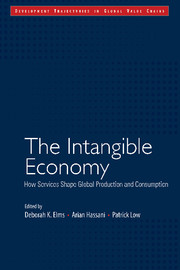Book contents
- Frontmatter
- Contents
- List of Figures, Tables and Boxes
- Acknowledgements
- 1 Introduction
- 2 Contextualizing Services in the World Economy
- 3 Services and Development: Priorities for Reform
- 4 Gainfully Linking into Global Value Chains: A Middle-Income Country's Perspective
- 5 Who Governs Global Value Chains?
- 6 Supply Chain Finance
- 7 Services and Economic Integration in ASEAN
- 8 Indian IT Firms: The Push for Innovation
- 9 Leveraging Business Process Outsourcing for Growth
- 10 Services in Global Value Chains and the Impact of Policy
- Contributors
- Index
- Development Trajectories in Global Value Chains
10 - Services in Global Value Chains and the Impact of Policy
Published online by Cambridge University Press: 19 October 2018
- Frontmatter
- Contents
- List of Figures, Tables and Boxes
- Acknowledgements
- 1 Introduction
- 2 Contextualizing Services in the World Economy
- 3 Services and Development: Priorities for Reform
- 4 Gainfully Linking into Global Value Chains: A Middle-Income Country's Perspective
- 5 Who Governs Global Value Chains?
- 6 Supply Chain Finance
- 7 Services and Economic Integration in ASEAN
- 8 Indian IT Firms: The Push for Innovation
- 9 Leveraging Business Process Outsourcing for Growth
- 10 Services in Global Value Chains and the Impact of Policy
- Contributors
- Index
- Development Trajectories in Global Value Chains
Summary
Introduction
The growing importance of services has been one of the most significant trends in the global economy in the last few decades. In high-income countries, the value-added service sector accounted for 74 per cent of GDP in 2011. The dominance of the service sector is not unique to developed economies. Its shares in middle-income, low-income and least developed countries are also significant, amounting respectively to 53 per cent, 49 per cent and 43 per cent. Services are similarly important to employment. Approximately 45 per cent of jobs in the world in 2010 were in the service sector. In high-income countries, this figure reaches 74 per cent.
The importance of the service sector to the world economy has been reinforced by the rise of GVCs. With advances in telecommunications, transportation and IT, services can now be imported from distant locations with cost advantages. Service suppliers in developing countries, such as call centre service providers, can now access the world market by taking part in GVCs. Moreover, services are consumed by manufacturing firms as intermediate inputs to goods, contributing significant value to final goods. According to TiVA statistics jointly compiled by the OECD and the WTO, service inputs account for 47.7 per cent of the value of gross exports in goods of OECD countries. Even this figure likely underestimates the value of services in trade because services provided in-house in manufacturing firms that are not supplied on an arms-length basis, will not be separately identified in the statistics.
In this chapter, we intend to further our understanding of the linkage between services and manufacturing in a GVC context by analysing the experiences of Singapore and Thailand, drawing on insights from value chain level case studies conducted by the authors and their colleagues.
The next section discusses current literature on the relationship between the services and manufacturing sectors. The subsequent section sets out the various ways through which policy may influence services in manufacturing value chains, making reference to illustrations from case studies conducted by the authors and their colleagues. The last section explores policies in Singapore and Thailand, which have different economic structures and policy backdrops, in an attempt to set out government best practices for enhancing value addition of services in manufacturing GVCs.
- Type
- Chapter
- Information
- The Intangible EconomyHow Services Shape Global Production and Consumption, pp. 167 - 188Publisher: Cambridge University PressPrint publication year: 2017

